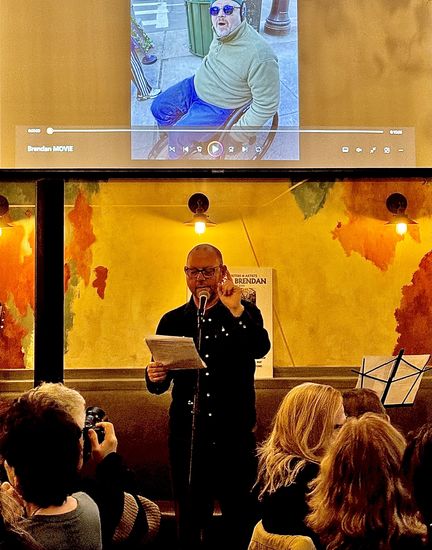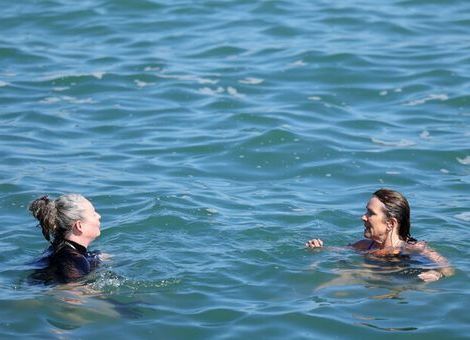Fr. Andrew O'Connor, the designer of the tie, is based at the Church of the Holy Family at Castle Hill Avenue in the Bronx. He creates fair-trade fashions for men and women under a label called "Goods of Conscience."
The business has three sections - Mission Guatemala, Mission Bronx and Mission Green - and the proceeds go to charity.
Both women and men buy his clothes, but "a lot more men are buying now," O'Connor says, adding that it's a sign of a healthy business.
Fr. O'Connor, 47, grew up the fifth of nine children in New Haven, Connecticut. He was ordained into the priesthood in 1996, and has worked in the Castle Hill Parish for two-and-a-half years. Before that he served in Holy Trinity parish in the Upper West Side.
His office is lined with books including "Selected Poems of W. H. Auden," "The Joy of being Wrong," and "Joyce" by Richard Ellmann, a reminder of his student days when he earned a masters degree in Irish literature.
On his desk stands evidence of his artistic talent, a bronze male figure with arms outstretched in crucifix pose. It's a cast. O'Connor gave the original to Jean-Marie Lustiger, the Parisian cardinal, when he visited New York.
Goods of Conscience employs seven people in the Bronx and 30 in Guatemala. The design label has gone from strength to strength, with designs recently featuring in various magazines including Lucky, Harper's Bazaar and Vogue. O'Connor's designs have been worn by Cameron Diaz and have received special mention from Vogue editor, Anna Wintour.
The clothes sell by mail order all over the U.S. and in Europe.
"We sell to people in Spain, Italy, France, England," O'Connor says. "We haven't sold any clothes in Ireland yet."
He says he'll give a discount to Irish people who get their orders in before St. Patrick's Day.
The garments are mostly made from a Guatamalan fabric, in olive, brown, midnight blue and white. Some of the colors occur naturally, while others are from Indian dyes.
A brown hue called "husk" comes from coconut husk and avocado. O'Connor also uses El Salvadorean organic indigo, made from a blue powder that sometimes causes a stir when he brings it through customs.
The Goods of Conscience workshop is in a basement beside the Bronx rectory. In this clean, airy set of rooms - the space was formerly a kindergarten, and has a "cheerful quality," O'Connor says - he creates the designs and Bronx seamstresses sew them together.
A long blackboard in one of the rooms is choc-a-bloc with chalk drawings and measurements. In another room, dresses and shirts in a range of hues hang on clothes-rails, and a photographer's light stands in the corner.
Last week, a photographer was on the roof of the building conducting a shoot, with Manhattan and the Bronx as a backdrop.
O'Connor founded the not-for-profit company in 2005 after attending a retreat in Guatemala. He uses Guatemalan products, sewing in Christian patterns with a high-tech luminous yarn from the U.S. In some of his garments O'Connor also uses Donegal tweed and the styles are simple and versatile.
"Designers, especially when they start out, tend to do so many complicated things," says O'Connor, who addressed students at Parson's Design School in fall last year. "But they need to keep it simple."
In addition to their quality, the success of Goods of Conscience products stems from the priest's connections. His creations reached the attention of Vogue after a woman, to whom he was giving pre-marriage advice, mentioned she worked for the magazine. He brought her to the workshop to see his designs, and the rest is history.
"New York is a great place to meet people," he points out. At his previous posting in the Upper West Side, there was "an enormous amount of people who are well-connected."
"I can't tell you how many of these relationships come from the priesthood," O'Connor says.
"I know the church has had its difficulties in Ireland but it would be a pity to throw the baby out with the bathwater. There's a simplicity to the priesthood," he says.
"As human beings become more dispensable, the community disappears. People still have social groups, but not community."
Community certainly plays a role at Fr. O'Connor's Bronx workshop. A New York-based Leitrim woman gave O'Connor a Singer sewing machine which he plans to put to good use, and someone else living nearby donated pieces of antique Parisian lace.
And as for the ties suitable for St. Patrick's Day, a snip at $55, some of the cloth comes from Gammarelli Ecclesiastical Tailoring in Rome where the pope is known to buy his vestments.
"You just have to know where to buy it," O'Connor says of his soon to be high fashion raw material.
Details on the clothing and other items produced, and how to purchase them, are available at www.goodsofconscience.com.








